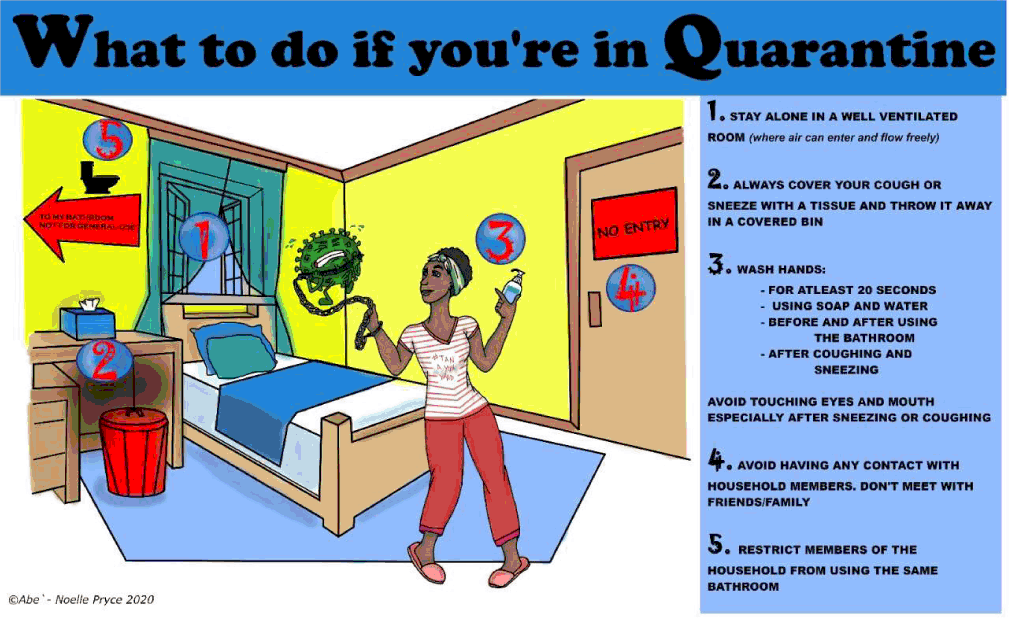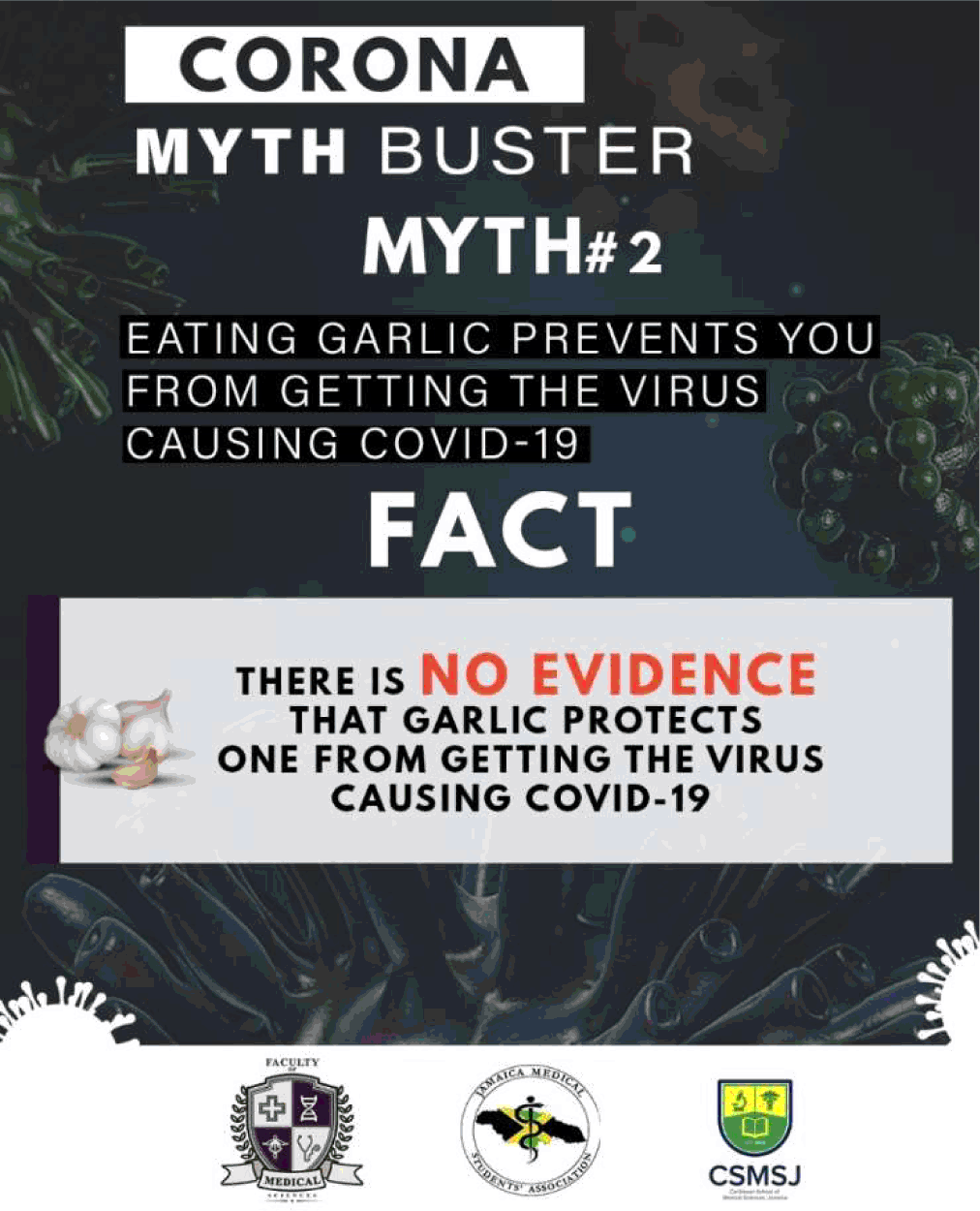Some quarantine measures that should be heeded that was posted on our social median platforms

Nidhi Thomas1
doi: http://dx.doi.org/10.5195/ijms.2020.618
Volume 8, Number 2: 188-190
Received 21 06 2020: Rev-request 05 07 2020: Rev-recd 07 07 2020: Accepted 30 07 2020
March 10, 2020 marked Jamaica's first confirmed case of coronavirus disease 2019 (COVID-19). With this news, public panic was imminent. By March 13, 2020, proactive measures were implemented to include deploying police and soldiers to restrict movement within the communities, closing schools at all levels and air travel ban.1 Before the virus reached our shores, and the situation became worse overseas, I was filled with dread; expecting total utter chaos, leaving my country ravaged and crippled. As a medical student at The University of the West Indies (UWI) doing clinical rotations, I was well aware of the limitations of our resources.
The Jamaican government actively kept the public informed; but misconceptions and false information were proliferating at an alarmingly rapid rate. This could lead to life threatening consequences,2 and eventually cripple the health system. Although medical students cannot be on frontline, we could still make a positive impact.3,4 After all, “prevention is better than cure” and being a part of the Standing Committee on Medical Education of the Jamaica Medical Students’ Association, had taught me the importance of social accountability. Consequently, through my initiative, COVID-19 Health Education and Promotion program was implemented on March 14 with the aim to educate the general public on COVID-19 as well as possible mitigative measures that are more targeted towards the current situation but could be applied in the future via social media such as Facebook, Instagram and so on.
In ventures like this one, support, especially in large numbers, is a key factor to ensure success and sustainability. Ninety-five members from across the healthcare spectrum joined the team of medical students. They included UWI dentistry, nursing, physical therapy, pharmacy and radiology students, as well as medical students from the Caribbean School of Medical Sciences, Jamaica. Our team also included nurses; medical doctors (from interns to consultants) and members of academia. With the blessing of our dean and enrolling the program with the International Federation of Medical Students’ Associations (IFMSA), the credibility of our activity was fully established.5
As our members were from across the Caribbean, this project extended beyond Jamaica. Four working groups were established: Graphics, Information Analysis, Misconceptions and Myth Debunkers, and Question and Answer. Graphics is a vital component in the success of the program; we managed to find students who were able to make interesting infographics, ranging from posters to comic strips (Figure 1).
Figure 1.Some quarantine measures that should be heeded that was posted on our social median platforms

The Information Analysis team was responsible in evaluating the different sources to determine the information that needed to be promoted more. The ultimate goal of our project was to not only create our own graphics but to also bring credible information from Caribbean and Global non-governmental organizations to the public's eye that may be buried in the myriad of misinformation. Our Misconceptions and Myth Debunkers team worked at keeping up with the latest research to find the studies that could counteract these misconceptions, and by using the expertise of our healthcare professionals (Figure 2). Finally, the Question and Answer team were tasked with dealing with questions on COVID-19 that were either going unnoticed or were not fully addressed.
Figure 2.An example of a common myth that was debunked that was posted on our social media platform.

Now that we had the information, we needed it to be available in a simple and understandable format to the public. Our information was first vetted by working group members to ensure that information was not only accurate but comprehensible. We then sought the opinions of non-medical personnel to confirm that the information was effectively being communicated. Due to the effectiveness of social media in ensuring maximal dissemination of the content,6 our members posted it via their various personal social media platforms. We targeted community, family and church groups. Our organization's social media platform was also utilized, and our content was reposted by the Jamaica Medical Students’ Association and the International Federation of Medical Students’ Associations community.
Although, I had the support of my team, it was undeniable that I felt overwhelmed at leading a project of such caliber. Will I be up to the task? Will I have the soft skills to manage the people under my leadership? Will we be able to make content that will replace the public's misconceptions? Although these doubts taunted me, I was still filled with pride that so many students and healthcare professionals were interested and willing to participate.
We were able to see the positive impact of our program, as more people sought advice from us. However, we faced challenges; we started this project when our classes were postponed, and our university sought to change to an online platform to safely accommodate and educate the students. Once classes restarted, it became increasingly hard to juggle our academic studies and create content. Also, the interest from our members started dwindling and this significantly impacted the production of our content. Currently, we are looking for strategies to reignite student engagement such as by having one-on-one interactions with students to indicate their opinions and interest matters.
Health literacy is imperative to driving behavioral modification.7 By engaging students and healthcare professionals in health education and promotion, we can reap long term benefits for not only Jamaica but also the Caribbean.
I wish to thank Dr. Maxine Gossell-Williams, Dr. Jean Williams-Johnson, Dr. Camille-Ann Thoms-Rodriguez, Binol Balachandar, Rachel Williams, Abé - Noelle Pryce, Jermaine Levene, Carol Madu, students from the Faculty of Medical Sciences, UWI (Mona Campus) and students from the Caribbean School of Medical Sciences, Jamaica for all the support they gave me though this initiative.
The Authors have no funding, financial relationships or conflicts of interest to disclose.
Author contribution: Conceptualizacion, Project Administration, Writing – Original Draft Preparation, & Writing – Review & Editing: NT.
1.Ministry of Health & Wellness. Jamaica's Travel Advisory for COVID-19. Available from: https://www.moh.gov.jm/jamaicas-travel-advisory-for-covid-19/. Last updated June 24, 2020; cited Jun 24, 2020.
2.Tasnim S, Hossain M, Mazumder H. Impact of Rumors and Misinformation on COVID-19 in Social Media. J Prev Med Public Health. 2020 May;53 (3):171–174.
3.O'Connor-Terry C, Gowda T, Zuchelkowski B, Minney S, Kwon J. Medical Students Have a Powerful Role in Addressing Community Needs in the COVID-19 Pandemic: An Experience from the US. Int J Med Students. 2020 Jan-Apr;8 (1):70–72.
4.Bonilla-Escobar FJ. Leadership and Health: The Scientific Journal's Mission of Spreading Science in Times of Pandemic. Int J Med Students. 2020 Jan-Apr;8 (1):9–10.
5.International Federation of Medical Students Associations. IFMSA COVID19 Response. Available from: https://ifmsa.org/covid19/. Last updated April 6, 2020; cited June 21, 2020.
6.Stellefson M, Paige SR, Chaney B, Chaney D. Evolving Role of Social Media in Health Promotion: Updated Responsibilities for Health Education Specialists. Int. J. Environ Res Public Health. 2020 Feb 12;17 (4):1153.
7.Taggart J, Williams A, Dennis S, Newall A, Shortus T, Zwar N, Harris MF. A systematic review of interventions in primary care to improve health literacy for chronic disease behavioral risk factors. BMC Family Practice. 2012 Jun 1;13:49.
Nidhi Thomas, 1 Bachelor of Medicine, Bachelor of Surgery (MB, BS) - UWI, Mona (2021 Candidate). University of the West Indies, Jamaica Medical Students' Association (JAMSA) Standing Committee on Medical Education, International Federation of Medical Students’ Associations (IFMSA)
Francisco J Bonilla-Escobar, Editor
Thanthima Suwanthawornkul, Student Editor
Lakshmimathy Subramanian, Student Editor
About the Author: Nidhi Thomas is 5th year medical student at the University of the West Indies, Kingston, Jamaica of a 5-year program. She is an active member of the Jamaica Medical Students’ Association Standing Committee on Medical Education and is the recipient of Jamaica Medical Students’ Association (JAMSA) President's Award for Excellence 2018-2019 and JAMSA Council Member of the Year 2018-2019.
Correspondence: Nidhi Thomas, Address: Kingston 7, Jamaica, W.I. Email: nidtreas@gmail.com
Cite as: Thomas N. Utilizing Health Education and Promotion to Minimize the Impact of COVID-19. Int J Med Students. 2020 May-Aug;8(1):188-90.
Copyright © 2020 Nidhi Thomas
This work is licensed under a Creative Commons Attribution 4.0 International License.
International Journal of Medical Students, VOLUME 8, NUMBER 2, August 2020